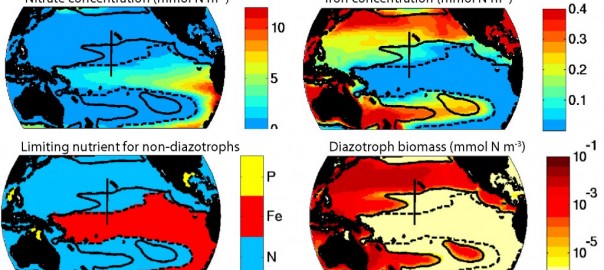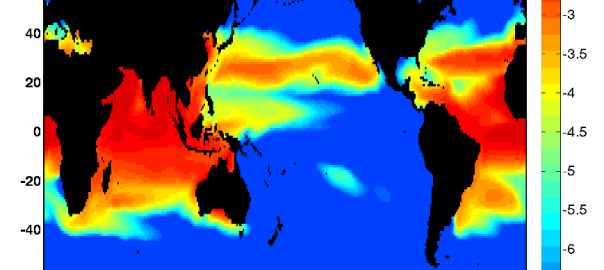Publication
Prowe, A. E. F., M. Pahlow, S. Dutkiewicz, M. Follows, and A. Oschlies (2012), Top-down control of marine phytoplankton diversity in a global ecosystem model, Progr. Oceanogr., doi:10.1016/j.pocean.2011.11.016
Prowe, A. E. F., M. Pahlow, S. Dutkiewicz, M. Follows, and A. Oschlies (2012), Top-down control of marine phytoplankton diversity in a global ecosystem model, Progr. Oceanogr., doi:10.1016/j.pocean.2011.11.016
In this video, which grew out of a Plenary Lecture at the Spring 2012, American Geophysical Union, Ocean Sciences meeting in Salt Lake City ,UT, “Modeling Marine Microbes: From Molecules to Ecosystems”, Mick talks about the past, present and future of marine ecosystem modeling. In particular he explains how his group uses numerical simulations to understand the organization of plankton populations and how advances in cell biology and microbiology might inform future models.
Continue reading At the intersection of biology and physics in the ocean
Ward, B.A., S. Dutkiewicz, O. Jahn, and M.J. Follows (2012), A size structured food-web model for the global ocean: Linking physiology, ecology and biogeography, Limnology and Oceanography, 57, 1877-1891, doi: 10.4319/lo.2012.57.6.1877
Monteiro, F. and M.J. Follows (2012), On nitrogen fixation and preferential remineralization of phosphorus. Geophys. Res. Lett., 39, L06607, doi: 10.1029/2012GL050897
Dutkiewicz, S., B. A. Ward, F. Monteiro, and M. J. Follows (2012), Interconnection of nitrogen fixers and iron in the Pacific Ocean: Theory and numerical simulations, Global Biogeochem. Cycles, 26, GB1012, doi: 10.1029/2011GB004039
Karsenti, E., S.G. Acinas, P. Bork, C. Bowler, C. De Vargas, J. Raes, M. Sullivan, D. Arendt, F. Benzoni, J.-M. Claverie, M. Follows, G. Gorsky, P. Hingamp, D. Ludicone, O. Jaillon, S. Kandels-Lewis, U. Krzic, F. Not, H. Ogata, S. Pesant, E.G. Reynaud, C. Sardet, M.E. Sieracki, S. Speich, D. Velayoudon, J. Weissenbach, P. Wincker (2011), A Holistic Approach to Marine Ecosystems Biology, PLoS Biology, 9(10), 1-5, doi: 10.1371/journal.pbio.1001177

Nitrogen is an essential component of all cells. It is used to make the amino acid building blocks of proteins, and is also required in the nucleic acids of DNA and RNA. Although nitrogen extremely abundant in the open ocean, it is mostly found in dissolved N2 molecules that cannot be used by most phytoplankton, who require nitrogen in its reduced, or “fixed” forms, such as nitrate or ammonium.
Continue reading Ecology of nitrogen fixers in the Pacific Ocean
Mixotrophic organisms combine autotrophic and heterotrophic nutrition and are abundant in both freshwater and marine environments. Recent observations indicate that mixotrophs constitute a large fraction of the biomass, bacterivory, and primary production in oligotrophic environments. While mixotrophy allows greater flexibility in terms of resource acquisition, any advantage must be traded off against an associated increase in metabolic costs, which appear to make mixotrophs uncompetitive relative to obligate autotrophs and heterotrophs.
Continue reading Biophysical Aspects of Resource Acquisition and Competition in Algal Mixotrophs

In this study, Fanny Monteiro, Stephanie Dutkiewicz and Mick Follows, interpret the environmental controls on the global ocean diazotroph biogeography in the context of a three-dimensional global model with a self-organizing phytoplankton community.
Continue reading Biogeographical controls on the marine nitrogen fixers
Ward, B.A., S. Dutkiewicz, A.D. Barton and M.J. Follows (2011), Biophysical Aspects of Resource Acquisition and Competition in Algal Mixotrophs, The American Naturalist, Vol. 178, No. 1 (July 2011), pp. 98-112, doi: 10.1086/660284